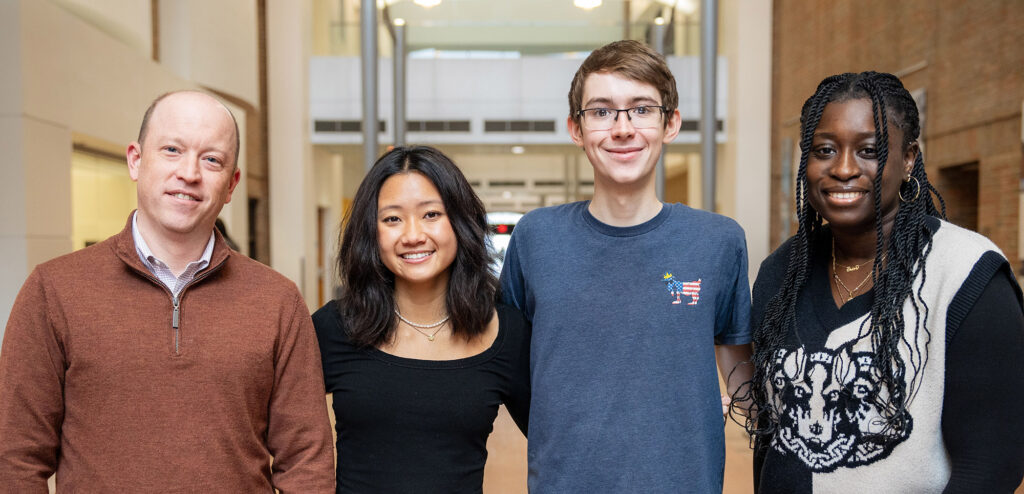New Quant-UM organization empowers undergrads interested in Quantum Science and Technology

Like many engineering students, Erin Diran-Ojo didn’t have much exposure to quantum science and technology early in her undergraduate career. But then she took a fellowship with the Open Quantum Initiative, a program offered by the Chicago Quantum Exchange, where she discovered her passion for quantum topics.
“There are all these quantum mechanisms informing the basic technology we use and the way we understand how things move in physics,” said Diran-Ojo, who is a junior in Electrical Engineering. “That’s one of the main reasons why I’m interested in quantum, because it’s a way to go deeper into everything.”
Through her fellowship, Diran-Ojo connected with another U-M student passionate about quantum science and technology—David McDermott, a Physics major in LSA. Together, they founded Quant-UM, a student club that seeks to connect undergraduates across the university with quantum science resources and opportunities.
“Michigan students are poised to be future leaders in industry, and we hope Quant-UM can give them sufficient exposure and understanding of quantum technology so that they can embrace it as it accelerates in the future,” McDermott said. “I’m excited to create a space and a community for students to cultivate their interest, discover new things together, meet new coworkers and collaborators, and share their questions and ideas with one another.”
Quantum science is already revolutionizing many classical technologies used across a variety of areas, including medicine, hardware and software development, finance, and machine learning. Because of quantum’s highly interdisciplinary nature and its potential to impact many different fields, Diran-Ojo and McDermott felt strongly that the club needed to be open and supportive to students from many different backgrounds, not just STEM.
“Quantum technology promises to be a centerpiece of future innovation, and every mind has valuable contributions to bring to the field, no matter their background,” McDermott said. “I encourage any student who is even somewhat curious about quantum science and technology to learn a little more about it and think about the ways they could be interacting with it in their future lives, even if you are not a STEM student.”
The club is partnering with U-M’s newly established Quantum Research Institute to further connect students with quantum opportunities on campus. Members will get to tour quantum labs and network with faculty and graduate students working on a variety of quantum research projects. The club also plans to host speakers from both the university and external organizations who are working in quantum fields.
“One of the goals of the university is to establish ourselves as a leader in both quantum research and quantum education,” said Prof. Alex Burgers, who serves as the faculty advisor for Quant-UM. “We want the best quantum groups in the world to be recruiting our students, and supporting this club is absolutely helping that mission.”
In addition to establishing the Quantum Research Institute, U-M has prioritized hiring new faculty who specialize in quantum sciences and has expanded course offerings in quantum science and technology for both graduate and undergraduate students. In ECE, new undergraduate courses on Quantum Information Science and Engineering are designed to be accessible to everyone, such as a sophomore-level class that has no college-level math requirements.
But even if students don’t plan to pursue a career in quantum fields, being knowledgeable about the topics will be an invaluable asset in many different industries.
“This sector will play an important role in our society, and there are going to be a lot of people making promises about what quantum can do,” Burgers said. “We want our students to be able to think very critically about whether or not those promises are real, and this club will give our undergrads a really great way of having these meaningful conversations with people in both the industry and the academic sector.”
 MENU
MENU 
